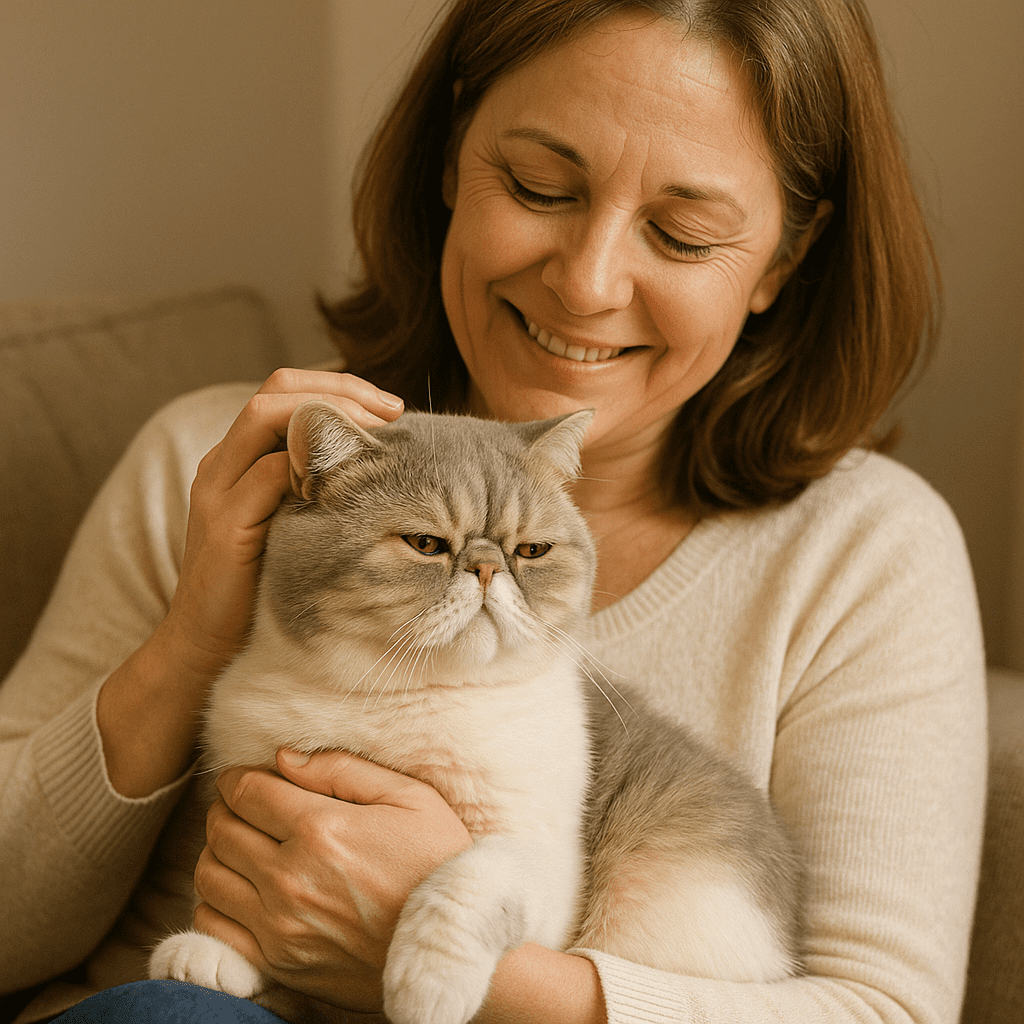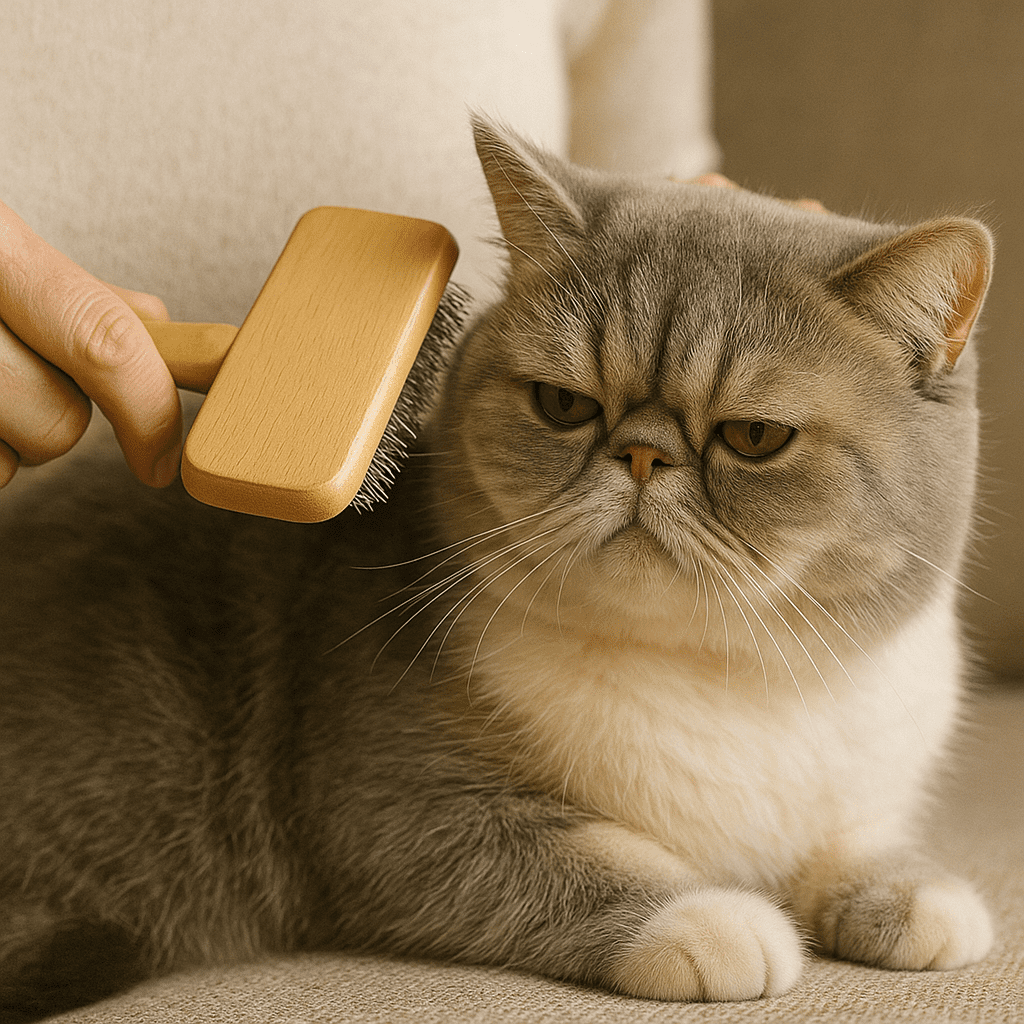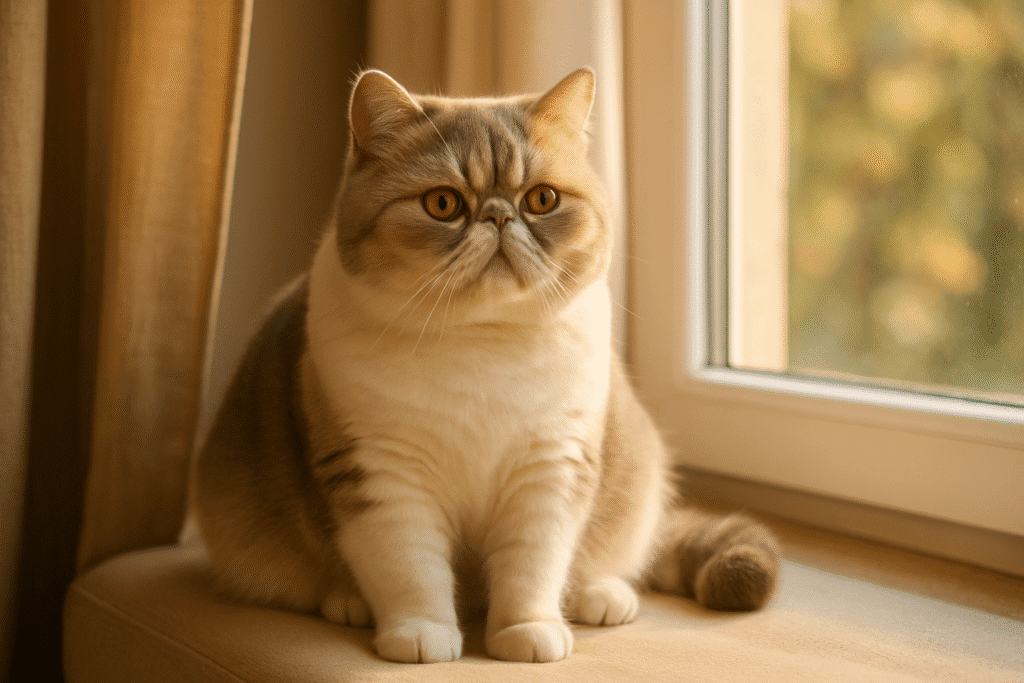Snippet (40–50 words): Discover everything about the Exotic Shorthair Cat in this complete care guide. Learn about their affectionate personality, easy-to-manage grooming needs, and the most common health issues. Perfect for families and cat lovers, this guide will help you raise a healthy and happy Exotic Shorthair.
Introduction to the Exotic Shorthair Cat
The Exotic Shorthair Cat is often called the “lazy person’s Persian” because of its similar appearance to the Persian cat but with a short, plush coat that requires far less maintenance. Developed in the 1960s by crossing Persians with American Shorthairs, this breed is adored for its teddy bear-like look, calm temperament, and loyal nature.

Exotic Shorthair Cat Personality Traits
When it comes to personality, the Exotic Shorthair Cat is affectionate, playful, and family-oriented. They are not as independent as some other breeds and prefer being around their humans as much as possible.
Affectionate Nature of Exotic Shorthair Cats
Exotic Shorthairs love cuddles, petting, and attention. Their gentle personality makes them excellent companions for families, singles, and seniors alike.
Playful Side of Exotic Shorthair Cats
While they enjoy playtime with toys and interactive games, Exotic Shorthair Cats are not overly hyperactive. They balance playful energy with calm relaxation.
Exotic Shorthair Cat Compatibility with Children and Pets
Known for their even temperament, Exotic Shorthair Cats generally get along well with children and other pets when introductions are handled properly.
Exotic Shorthair Cat Grooming Needs
One of the biggest advantages of the Exotic Shorthair Cat is its lower grooming demands compared to Persian cats. Still, they require regular coat and eye care.
Brushing the Exotic Shorthair Cat Coat
Weekly brushing is recommended to remove loose fur and prevent tangles. Their dense, plush coat benefits from extra care during shedding seasons.
Eye Care for Exotic Shorthair Cats
Due to their flat facial structure, Exotic Shorthair Cats are prone to tear staining. Gently wiping the eyes daily helps prevent buildup and discomfort.
Bathing Exotic Shorthair Cats
Occasional baths using cat-safe shampoo help manage shedding and keep the Exotic Shorthair Cat’s coat healthy and clean.

Common Health Issues in Exotic Shorthair Cats
The Exotic Shorthair Cat is generally healthy but can inherit conditions from its Persian lineage. Awareness and early care are key.
Brachycephalic Concerns in Exotic Shorthair Cats
The breed’s flat face may cause breathing issues, snoring, or noisy breathing. Weight management and regular vet checkups reduce risks.
Polycystic Kidney Disease in Exotic Shorthair Cats (PKD)
This hereditary disease can affect kidney health. Ethical breeders test for PKD, and routine veterinary ultrasounds are recommended.
Dental Problems in Exotic Shorthair Cats
The compact jaw of the Exotic Shorthair Cat can lead to overcrowded teeth. Regular brushing and dental checkups are essential.
Obesity in Exotic Shorthair Cats
Due to their calm lifestyle, Exotic Shorthair Cats can gain weight easily. Controlled portions and daily play sessions help maintain a healthy weight.
Training Exotic Shorthair Cats
The Exotic Shorthair Cat is intelligent and responds well to positive reinforcement. They can be trained to use scratching posts, follow routines, and engage in simple tricks with treats and praise.
Living with an Exotic Shorthair Cat
Adaptable and affectionate, the Exotic Shorthair Cat thrives in apartments and larger homes alike. They need cozy resting spots, scratching posts, and daily interaction to remain happy.
Exotic Shorthair Cat Diet & Nutrition
A healthy diet is vital for the Exotic Shorthair Cat. High-quality cat food rich in protein, moderate in fat, and low in fillers keeps them in good shape. Wet food helps with hydration, while dry food supports dental health.

Frequently Asked Questions (FAQ)
- Are Exotic Shorthair Cats good for first-time owners?
Yes, the Exotic Shorthair Cat’s affectionate and low-maintenance nature makes them ideal for beginners. - How often should I brush my Exotic Shorthair Cat?
Weekly brushing is enough, though daily grooming may be useful during heavy shedding seasons. - Do Exotic Shorthair Cats get along with dogs?
Yes, Exotic Shorthair Cats typically adapt well to dogs when introduced gradually. - What health issues affect Exotic Shorthair Cats?
They may face PKD, brachycephalic breathing problems, dental disease, and obesity. Regular vet visits are essential. - What is the average lifespan of an Exotic Shorthair Cat?
Most Exotic Shorthair Cats live between 12–15 years with proper care.
Conclusion
The Exotic Shorthair Cat combines Persian beauty with easier care, making it a beloved companion worldwide. Their affectionate personality, manageable grooming, and adaptability make them perfect for many households. With proper diet, veterinary care, and daily love, your Exotic Shorthair Cat can live a long and joyful life.
👉 See more cat breed guides here

